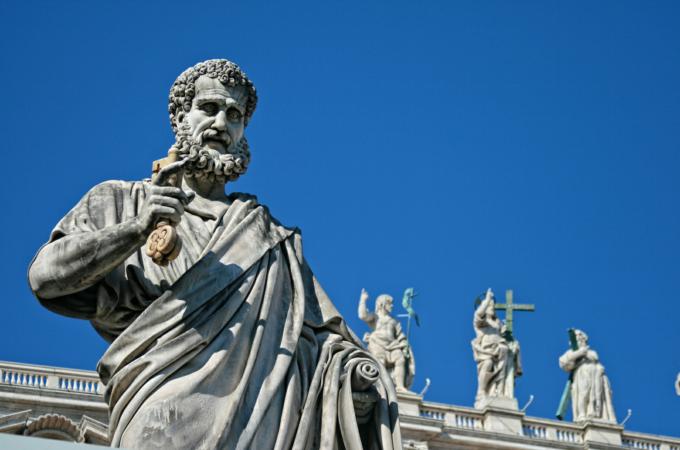The worst pope in history
St. Peter was without doubt the worst pope in history.
I hope you were shocked by this opening line, since that was my intent. But I meant it only in the trivially true sense that, since Peter was the only pope up to his time, he was by definition the worst -- and the best.
And I wanted to shock you, because I want you to appreciate that if early Christians had had a critical spirit, which they did not, it would have been quite easy to portray Peter as a horrible pastor.
They lacked a critical spirit because the price of becoming a Christian was too high. You wouldn't convert to Christianity unless you had faith in the guidance of the Holy Spirit and Peter's standing as Christ's vicar. And with such faith, you would ascribe any evils you experienced, not to bad leadership, but to a gift from God -- the gift of participation in the life and passion of the Lord. Christians with a critical spirit under conditions of persecution would likely not persevere. Now, were they gullible or virtuous?
My reflections come from a recent reading of the great historical novel about early Christianity in Nero's Rome, "Quo Vadis," by Henryk Sienkiewicz, the Nobel Prize winning Polish author. Sienkiewicz's historical research was so extensive that to read this book is like being in Rome with the early Christians. They lived predominantly in the Trans-Tiber area, "Trastevere." I myself have lived there for a couple of months, as a visiting professor at Santa Croce University. But I can tell you that reading this book has helped me immeasurably more in understanding the plight of those early brothers and sisters in Christ. If you have a chance to go to Rome, read or reread this book first.
"Quo Vadis" is most remarkable for giving an account of the early Christians from the point of view of the Roman ruling elites, especially a patrician, Vinicius, and his uncle, Petronius Arbiter. The dissolute Nero is a looming presence over the whole narrative. We ourselves, from our love of "Western Civilization," perhaps, immediately take ancient Athens and Rome part of our past. But in Sienkiewicz's novel nothing is more evident than that ancient Rome is an old and obdurately pagan civilization, profoundly alien to what we call "Christendom."
Rome's aristocracy senses, too, that Christians are alien to it, and it attempts to crush them. It would have found some other way eventually to do so (and it did) other than blaming them for the great fire of Rome in 64 AD. But that charge was the pretext for the first great persecution of Christians, thrown to the lions in the Colosseum or burned as living torches to illuminate Nero's gardens.
We take it for granted but I want you to pause and meditate on this fact and all its implications: Peter chose deliberately to go to Rome just before this great persecution, to confirm the apostolate of the Christian community there. Of course, as a result of this choice, Peter's Chair, the "See of Peter," was established in Rome, which became the worldwide center of Christian fellowship, which is the Church.
Now I want you to consider how a Christian in Rome might have criticized Peter for this decision. First, before the persecutions:
"The first thing you did was reject all the traditions of the elders. That was disastrous! Our inherited faith was stable, at least. We had dietary laws which constituted and declared our identity. You abolished all that and substituted a handful of lax rules (see Acts 15:19-21)."
"Then, we were flourishing in the Holy Land. Jesus went to the synagogues first. Well, Christianity hasn't reached all the synagogues yet. Why haven't we gone there first? Why Rome?"
"There are many lovely places in the country which are sympathetic to our message, where Christians can live in peace. Think of Sicily or Liguria for instance! The pastoral culture there with its vineyards and shepherds is open to our spirit. But you lead Christians to this vast city, to the very citadel of pagan hardness against the Gospel! Nothing could be less propitious."
Then, after the persecutions begin:
"Hah, guided by the Holy Spirit?! You wretched leader! You've shown up just in time to lead your sheep into butchery. Listen to the cries of the tortured women and children. That's what you've brought us -- instead of flourishing in the gentle country, where maybe we'd have had a chance of changing society besides!"
"Our Church has been decimated. We were growing. Converts were everywhere. It's still growing in Jerusalem. But under your direction we have been destroyed!"
Sure, some of the wisdom of St. Peter's decision would have become apparent with the destruction of Jerusalem only a few years later. What other city could better serve as the center of the religion of the New Covenant? But the plan of providence would take centuries to unfold.
So, it would have been easy to criticize Peter as a terrible pope. But the early Christians as a rule did not do so.
I don't write this to defend an archaic ultramontanism today, but simply to suggest that, as the Holy Spirit has our work already cut out for us -- and it will be difficult, you can be sure of that! -- let's devote ourselves firmly to those tasks, while reserving larger judgments for the viewpoint of centuries.
- Michael Pakaluk, an Aristotle scholar and Ordinarius of the Pontifical Academy of St. Thomas Aquinas, is a professor in the Busch School of Business at the Catholic University of America. He lives in Hyattsville, MD, with his wife Catherine, also a professor at the Busch School, and their eight children. His latest book, on the Gospel of Mark, is "The Memoirs of St Peter." His next book,"Mary's Voice in the Gospel of John," is forthcoming from Regnery Gateway.



















